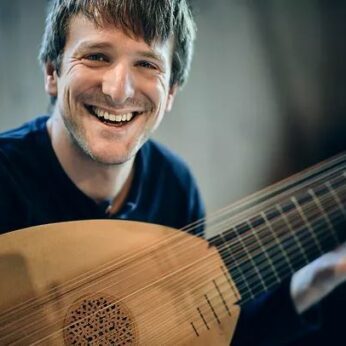Composer: Johann Friedrich Fasch (b. 1688 - d. 1758)
Performance date: 29/06/2023
Venue: St. Brendan’s Church
Duration: 00:17:22
Recording Engineer: Gar Duffy, RTÉ
Instrumentation: rec, vn, bn, lu, hpd
Instrumentation Category:Baroque Ensemble
Artists:
Ensemble Diderot (Johannes Pramsohler, Roldán Bernabé [violins], Alexandre Baldo [viola], Gulrim Choï [cello], François Leyrit [bass], Jadran Duncumb [lute], Philippe Grisvard [harpsichord]) -
[Baroque Ensemble]

The concept of ‘travel concertos’ as a genre does not exist, but every touring musician will recognise the idea. In those times the best musicians were employed by music-loving Princes with a Court ensemble such as Bach’s patron Prince Leopold of Köthen, who brought their own musicians when travelling. Most Baroque concertos could be played with single strings so an ensemble, like tonight’s, of two violins, viola, cello, bass, lute and harpsichord was able to play most concertos.
Pisendel was an outstanding virtuoso violinist, who is best known to posterity for the concertos written for him by leading composers of the day in particular by Vivaldi. On the famous visit of the Electoral Prince Friedrich August to Italy in 1716-17 Pisendel, then still in his twenties, was in his retinue with members of the renowned Dresden orchestra. The young German violinist became close friends with Vivaldi, who allowed him to copy in his own hand a large number of his works. Pisendel became the outstanding German violinist of his time with both Albinoni and Telemann dedicating works to him. Legend has it that Bach wrote his solo violin Sonatas and Partitas for him. Ten years after his Italian trips he eventually became concertmaster of the Dresden orchestra, then the most important ensemble in Europe.
Johann Friedrich Fasch was a big name composer and musician in eighteenth century Germany. Like Telemann he was offered the Leipzig post and turned it down well before they looked at Bach. In his lifetime Fasch neglected to publish his many works so they only exist in fragile 300yr-old manuscripts. These manuscripts were stored in Dresden in underground vaults where they were spared the World War II firestorms, but the vaults got flooded and the scores still got damaged.
Paul Durant was an eighteenth-century lutenist and composer based mostly in Bayreuth as part of Margrave Frederick III of Brandenburg’s court ensemble. Wilhelmine of Bayreuth, the sister of the Prussian King, was herself a lutenist, thus the blossoming of lute music in her court. Durant wrote several collections of sonatas, duets, trios and concertos for his instrument. Tonight’s multi-instrument concerto is most attractive. It cleverly intertwines the participating instruments to create some unusual and exciting timbres, more chamber music than concerto. The final Menuet, led by the lute brings the day’s music-making to a delightful close.
Copyright © 2025 West Cork Music. All rights reserved.
Designed and developed by Matrix Internet